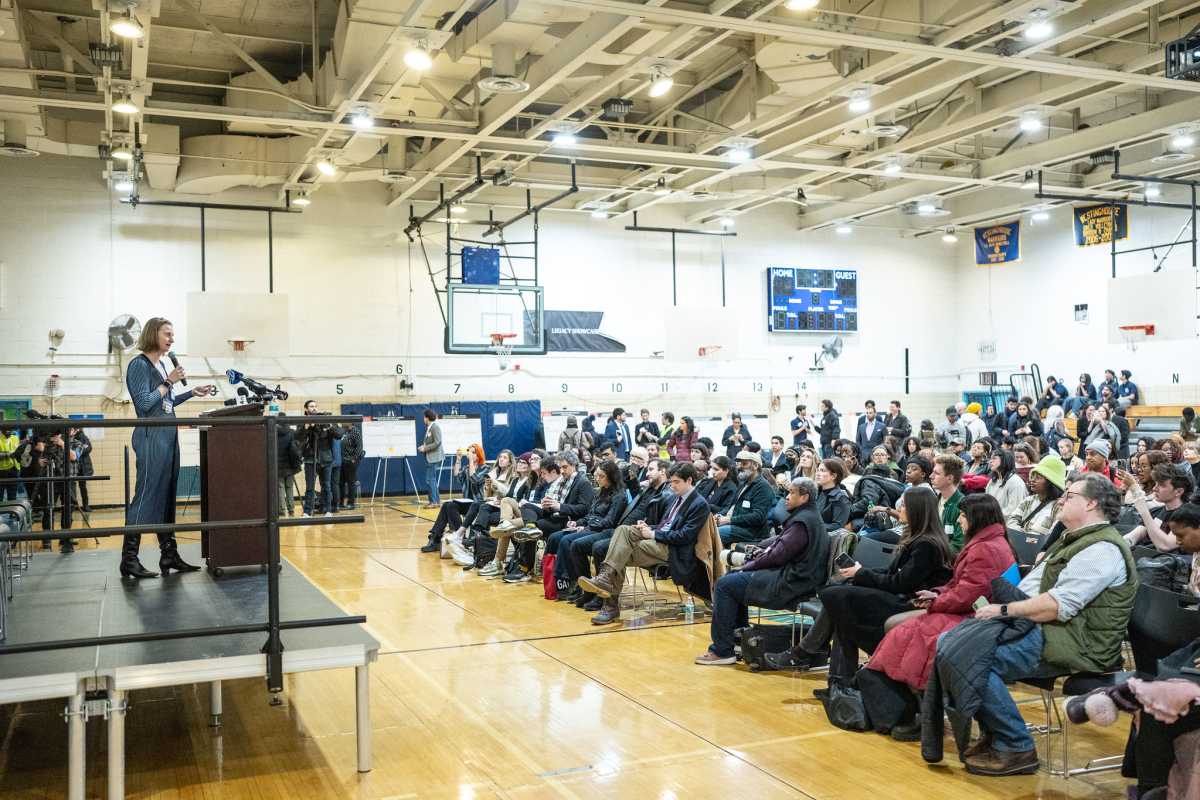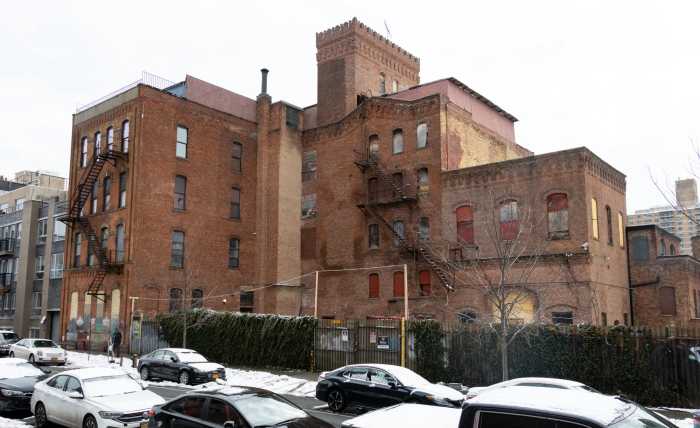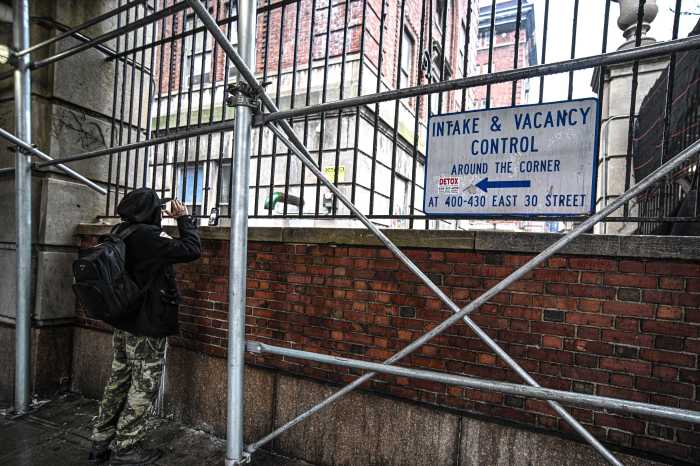Mayor Bloomberg was hailed as the savior of Coney Island this week, even as new questions emerged about his grand redevelopment vision — one that does not differ greatly from the Thor Equities plan it replaces.
“The mayor is my hero,” gushed Dick Zigun, founder of the Coney Island Circus Sideshow and unofficial mayor of Coney Island.
Zigun heaped lavish praised on the mayor for his biting dismissal last week of Thor Equities’s $1.5-billion vision for Coney Island.
“We [want] a developer who has real world-class experience,” Deputy Mayor Dan Doctoroff said at a Brooklyn Chamber of Commerce luncheon at Gargiulo’s on Nov. 8.
Bloomberg and Doctoroff’s public obituary to Thor Equities’ plan came after nearly a year of growing frustrated with developer Joe Sitt’s vision for the amusement district of Coney Island, between West Eighth and West 19th streets. Originally, Sitt wanted a massive, 24/7/365 outdoor-indoor amusement area, financed through large condo towers.
Responding to neighborhood objections, Sitt said he would instead generate revenue for his transformation of the People’s Playground into a “Vegas by the sea” with time-share hotel rooms.
But that change wasn’t enough to win him city backing, which he would need in order to get the zoning variance necessary to build a hotel and other attractions in the current Coney amusement zone.
So the city unveiled its own, remarkably similar plan.
“The mayor’s plan is a scaled down version of Thor Equities’ plan,” said Councilman Domenic Recchia (D–Coney Island), a one-time supporter of Thor Equities.
Like Sitt, Bloomberg sees a modern playground, which would include a movie theater, hotels, a new roller coaster and an indoor water park.
Similarly, the mayor’s plan calls for just one operator to transform the amusement district from a hodgepodge of concessionaires into a single theme park.
“Today, you can’t have a bunch of individual little things and have them survive, not when the public has entertainment alternatives,” said Bloomberg. “They can fly anyplace for next to nothing.”
Indeed, there are only two major differences in Bloomberg’s and Thor’s plans for the amusement district. First, Bloomberg wouldn’t permit hotel construction in the heart of the district or along the Boardwalk. And second, the city wants to rezone the amusement district as public parkland.
To do so, Bloomberg will still need to buy out Sitt — who paid more than $100 million for his land — and some smaller-time landowners, rezone the land, and then hand-pick a new developer.
Horace Bullard, a developer who owns land in the amusement district and who once harbored similarly grand visions for the area, said he didn’t think the administration would run into much opposition from local property owners.
“No one in his right mind will be fighting the city on this issue if he’s justly compensated for it,” said Bullard, one of the landowners who would, indeed, need to be compensated.
But not everyone shares Bullard’s rosy optimism.
Dennis Vourderis, whose family has operated the Wonder Wheel for 87 years and owned the Wheel, its popular kiddie park and the land under it for 24 years, doesn’t particularly want to cede his land.
“We hope that the city doesn’t force us to lose our land at an unfair price and against our wishes,” said Vourderis, frustrated that the city prefers an integrated theme park to a hodgepodge of honky-tonk, family-owned businesses.
“I’m already doing [amusements], what the city wants us to do, so leave me alone,” said Vourderis.
Recchia agrees.

“By working with the landowners, we could accomplish many things that the mayor wants to accomplish,” said Recchia. “If we don’t work with the landowners, this will wind up in court, which could tie up the plan for 10 years.”
The city was not prepared to say how much it would be willing to pay to buy out existing landowners, but costs could easily soar into the hundreds of millions.
At the luncheon, Doctoroff said that city would raise that kind of scratch through the sale of city land west of Keyspan Park — an area bounded by West 19th and West 24th streets, Surf Avenue and the Boardwalk — shown on administration maps as “Coney West.”
The area would have up to 2,700 new apartments and 360,000 square feet of retail space.
In addition to “Coney West,” there’s “Coney North,” bounded by W. 20th Street, Stillwell, Mermaid and Surf avenues. This area would also become a residential and retail district with up 1,800 new apartments and 100,000 square feet of retail.
Vourderis aside, the overall reaction among those invested in Coney Island was positive.
Indeed, even Recchia said the mayor’s plan was a good jumping-off point.
Chuck Reichenthal, the district manager of Community Board 13, said the plan addressed one of the community’s most-pressing concern: housing in the amusement district.
“That’s very important to us and affirms that the amusements will remain there,” said Reichenthal.
Michael Immerso, the author of “Coney Island, the People’s Playground,” was similarly hopeful.
“We’ve had a long period of decline, but the city is on the right track,” said Immerso. “By setting out broad guidelines and stating a public commitment to keeping some of what Coney Island was in the past, the city creates a situation where it can be held accountable. The battle lines are clearly drawn now and we’ll see how it plays out.”
That battle will likely involve Sitt, who said in a statement that he was “disappointed” by the mayor’s announcement.
“[We] are optimistic that a deal can be reached between the city, the landowners and the community to make Coney Island an even greater place to live and visit,” said Sitt.
Step right up
The mayor’s announcement that the city would buy out developer Joe Sitt and redevelop Coney Island on its own created winners and losers aplenty:
Winners
Carol Albert: The Astroland owner sold her land to Sitt for fair market price and expected to be shut down. Now, she’ll stay open — and the city will pay Sitt back.
Joe Sitt: He bought land in hopes of striking it big. Now he can hold the city over a barrel to get his price.
Horace Bullard: He’s owned land in Coney Island for decades — yet was not able to do a thing. Now, he’ll get paid off, too.
Losers
Joe Sitt: He wanted to build a legacy-making project and “save” Coney Island. But the city shoved him aside.
Dennis Vourderis: The owner of Deno’s Wonder Wheel Amusement Park will now have to fight a city effort to take his land.
Time-share lovers: Anyone who was dying to own a Coney time-share in a Sitt project will now have to settle for a mere hotel room.


























